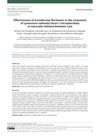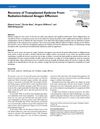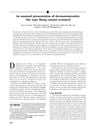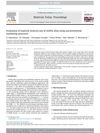1 citations,
October 2023 in “Animals” A small dose of Platycladus orientalis leaf extract improves raccoon dogs' growth and health, but higher doses can be harmful.
 1 citations,
August 2023 in “JAMA Dermatology”
1 citations,
August 2023 in “JAMA Dermatology” Increasing the dose of baricitinib to 4 mg helps more patients with severe alopecia areata regrow hair.

Reducing the dose of Baricitinib to 2mg still helped over half of the patients with severe scalp alopecia maintain their hair regrowth after two years.
 September 2023 in “Journal of The American Academy of Dermatology”
September 2023 in “Journal of The American Academy of Dermatology” Reducing the dose of Baricitinib to 2mg led to a loss of hair regrowth benefits in nearly half of the patients by Week-104.
 July 2023 in “Clinical and Experimental Dermatology”
July 2023 in “Clinical and Experimental Dermatology” Combining baricitinib with low-dose corticosteroids significantly improved severe hair loss in eight patients.
 January 2023 in “Revista Brasileira de Parasitologia Veterinária/Brazilian Journal of Veterinary Parasitology”
January 2023 in “Revista Brasileira de Parasitologia Veterinária/Brazilian Journal of Veterinary Parasitology” A single dose of fluralaner effectively treats mite infestations in cats without side effects.
 October 2022 in “Deleted Journal”
October 2022 in “Deleted Journal” Long-term low-dose Vitamin A intake may cause increased brain pressure.
 May 2018 in “Más dermatología”
May 2018 in “Más dermatología” The higher dose supplement was more effective in treating female hair loss.
February 2017 in “대한피부과학회지” Combining low-dose dutasteride with finasteride improved a man's hair loss.
 January 2003 in “Reactions Weekly”
January 2003 in “Reactions Weekly” Lowering the dose of cyclosporin caused hair loss that didn't improve even when the dose was increased again.
 July 1996 in “Annals of Internal Medicine”
July 1996 in “Annals of Internal Medicine” Long-term high-dose fluconazole can cause reversible hair loss.
 163 citations,
April 1953 in “Acta radiologica”
163 citations,
April 1953 in “Acta radiologica” Radiation therapy with a higher dose for the brain improves survival in cerebellar medulloblastoma.
20 citations,
December 1994 in “Fertility and sterility” Flutamide combined with a low-dose birth control pill effectively reduces excessive hair growth in women with polycystic ovarian disease.
12 citations,
June 2020 in “Lupus” Early treatment with the right dose of stem cells can reduce lupus symptoms.
 8 citations,
April 2013 in “Journal of The American Academy of Dermatology”
8 citations,
April 2013 in “Journal of The American Academy of Dermatology” Some breast cancer patients treated with high-dose docetaxel may experience permanent hair loss.
 1 citations,
March 2015 in “Journal of Cutaneous Medicine and Surgery”
1 citations,
March 2015 in “Journal of Cutaneous Medicine and Surgery” Eyebrow hair transplants can regrow after high-dose radiation therapy.
 1 citations,
November 2011 in “Open access journal of contraception”
1 citations,
November 2011 in “Open access journal of contraception” Birth control pills with low-dose estrogen and antiandrogenic progestins can effectively treat acne.
 August 2010 in “The Journal of Dermatology”
August 2010 in “The Journal of Dermatology” The document concludes that low-dose acne treatment is most suitable for moderate acne, with high patient satisfaction and low relapse rates.
 17 citations,
February 2011 in “Expert Opinion on Drug Safety”
17 citations,
February 2011 in “Expert Opinion on Drug Safety” Manage side effects of hepatitis C treatment with dose changes and medications, which may improve patient adherence and treatment success.
10 citations,
January 2015 in “European journal of pharmacology” Ginsenoside Rb1 may help remodel hypertrophic scars effectively at a dose of 0.56 mg.
 9 citations,
November 2000 in “Journal of the American Academy of Dermatology”
9 citations,
November 2000 in “Journal of the American Academy of Dermatology” A woman with a rare type of dermatomyositis improved with low-dose prednisone and methotrexate.
 8 citations,
January 1991 in “European Urology”
8 citations,
January 1991 in “European Urology” Finasteride lowers DHT levels and raises testosterone in a dose-dependent way.
 3 citations,
May 2022 in “Journal of The American Academy of Dermatology”
3 citations,
May 2022 in “Journal of The American Academy of Dermatology” The conclusion is that 24 weeks of low-dose oral minoxidil is safe for men with hair loss, with no significant changes in heart rate or blood pressure.
 1 citations,
January 2021 in “Skin appendage disorders”
1 citations,
January 2021 in “Skin appendage disorders” A woman with alopecia regrew her hair after taking a higher dose of tocilizumab.
 May 2023 in “JAMA network open”
May 2023 in “JAMA network open” After a New York Times article talked about using low-dose oral minoxidil for hair loss, more people started getting this drug prescribed, but this trend didn't last long.
September 2019 in “Hair transplant forum international” The study looked at the effects of any dose of finasteride, not a specific amount.
 November 2020 in “Journal of The American Academy of Dermatology”
November 2020 in “Journal of The American Academy of Dermatology” Finasteride 1 mg every other month works as well as daily dose for hair loss maintenance.
 December 1989 in “Inpharma (Balgowlah)”
December 1989 in “Inpharma (Balgowlah)” Cyproterone helps women with hair loss caused by genetics. More research is needed to confirm the best dose.
1108 citations,
January 2018 in “Dalton transactions” Platinum-based chemotherapy drugs can cause many severe side effects, often requiring dose reductions and additional medications to manage.
 12 citations,
August 2004 in “PubMed”
12 citations,
August 2004 in “PubMed” Finasteride, especially in a 1mg dose, effectively slows hair loss and improves hair growth in Japanese men with male pattern hair loss.






















